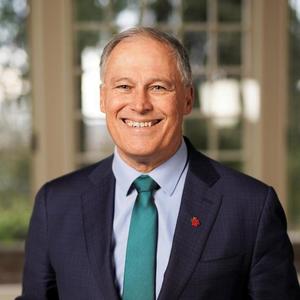Inslee signs bill to implement CFS in Washington

May 17, 2021
BY Erin Krueger
Washington Gov. Jay Inslee on May 17 signed legislation that will create a state-wide Clean Fuel Standard that will limit the aggregate, overall greenhouse gas (GHG) emissions per unit of transportation fuel energy to 20 percent below 2017 levels by 2035.
The requirement phases in with up to a 0.5 percent reduction for each year in 2023 and 2024, no more than an additional 1 percent each year beginning in 2025 through 2027, no more than an additional 1.5 percent each year beginning in 2028 through 2031, and no change in 2032 and 2033.
Advertisement
The legislation, HB 1091, was introduced in January. The Washington House of Representatives on Feb. 27 voted 52 to 46 to pass the bill. The Washington Senate on April 8 voted 27 to 20 in favor of an amended version of the bill. The House refused to concur to the Senate’s version of the amended bill on April 20. A conference committee was later convened. The Senate approved the conference committee report by a vote of 26 to 23 on April 25. The House voted 54 to 43 to adopt the conference committee report later that day. The legislation was delivered to the governor on April 26.
Inslee signed HB 1091 and two other pieces of climate legislation during an event held at Shoreline Community College. “This is a jobs package to solve climate change, and we ought to talk about it as a jobs package,” he said. “We’re going to put people to work with these bills. That’s what we’re doing.”
“Today we join the West Coast of the United States and British Columbia in adopting a clean fuels standard,” Inslee continued. “We know that cleaner fuels give us cleaner air to breathe. We know that transportation is our largest single sector of air pollution, so cleaning up our fuels is the best thing that we can do for the breathing of our children…The clean fuels standard is an anti-asthma bill. Our children deserve to breathe, and our people deserve cleaner fuels at a reasonable price."
Advertisement
Inslee cautioned the public from believing the “swill” that the CFS will increase fuel prices, noting that similar programs in California, Oregon and British Columbia demonstrate that is not the case. He also noted the CFS will provide those in Washington will more fuel choices while providing a market for locally produced fuels and reducing the need for foreign oil.
Additional information on the Washington CFS is available on the Clean Fuel Washington website.
Related Stories
SAF Magazine and the Commercial Aviation Alternative Fuels Initiative announced the preliminary agenda for the North American SAF Conference and Expo, being held Sept. 22-24 at the Minneapolis Convention Center in Minneapolis, Minnesota.
President Trump on July 4 signed the “One Big Beautiful Bill Act.” The legislation extends and updates the 45Z credit and revives a tax credit benefiting small biodiesel producers but repeals several other bioenergy-related tax incentives.
Saipem has been awarded an EPC contract by Enilive for the expansion of the company’s biorefinery in Porto Marghera, near Venice. The project will boost total nameplate capacity and enable the production of SAF.
Global digital shipbuilder Incat Crowther announced on June 11 the company has been commissioned by Los Angeles operator Catalina Express to design a new low-emission, renewable diesel-powered passenger ferry.
International Air Transport Association has announced the release of the Sustainable Aviation Fuel (SAF) Matchmaker platform, to facilitate SAF procurement between airlines and SAF producers by matching requests for SAF supply with offers.
Upcoming Events










